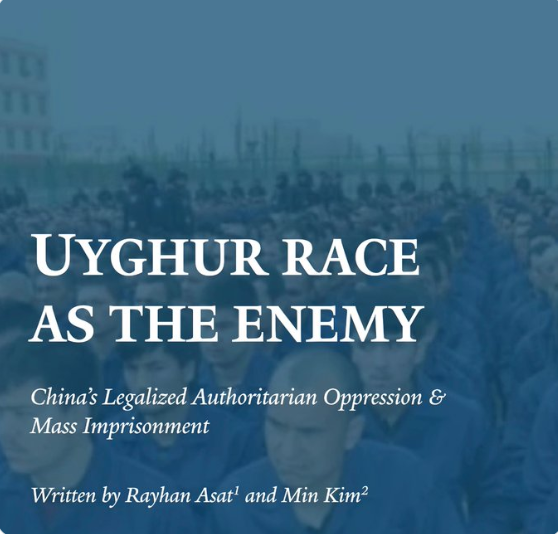China’s Legalized Authoritarian Oppression & Mass Imprisonment
Written by Rayhan Asat^1 and Min Kim^2
Yale Macmillan Center
Genocide Studies Program
This report demonstrates that China’s systematic, large-scale imprisonment of Uyghurs not only amounts to a crime against humanity and genocide, but also dangerous lawfare at mass scale. It explains that the imprisonment and sentencing at a scale that the world has not seen since World War II is the maximum reach of what scholars argue is “authoritarian legality.”It calculates that if the mass imprisonment continues, the Uyghur population is currently set to suffer from a cumulative total of 4.4 million years of imprisonment, undermining the possibility of a life of dignity, prosperity, and freedom for future generations as well.
EXECUTIVE SUMMARY
While the Chinese government’s oppression of Uyghurs dates back to decades ago, the acceleration started with the inception of the Strike Hard Campaign in 2014 when the People’s Republic of China (PRC) subjected the Uyghur community to severe repressive measures in pursuit of an alleged “People’s War on Terror”.^3 China asserts that the campaign aims to counter extremism and ensure national security. In reality, however, it has endangered the lives and livelihoods of countless innocent Uyghurs and other Turkic ethnic groups in the Xinjiang Uyghur Autonomous Region (XUAR) in violation of international law and China’s domestic laws. Numerous independent documentation and investigations, including the 2022 United Nations Office of High Commissioner for Human Rights (OHCHR) Assessment of Human Rights Concerns in the Xinjiang Uyghur Autonomous Region (hereinafter referred to as the “OHCHR Assessment”), have substantiated claims that the Chinese government’s War on Terror entailed extensive human rights violations within facilities that were labeled as “Vocational Education and Training Centers” (VETCs)^4 but were, in practice, mass internment camps. Based on their investigation, the OHCHR Assessment concluded that China’s actions in the XUAR may constitute an international crime, in particular, crimes against humanity.^5 The international community has voiced strong outrage and condemnation for years, but China has persisted in surreptitiously infringing upon the rights of the Uyghur and other Turkic people while the world found itself distracted with several other crises. Post-pandemic, China has been attempting to rewrite its image by hiding visible signs of its repression and presenting a “clean” image to Western media and tourists. Militarized checkpoints, surveillance cameras, and rampant police are no longer obvious parts of daily life in Xinjiang as far as tourists and visitors can see. However, China’s oppression is far from gone—it has simply hidden it better by legalizing its mass incarceration of Uyghurs.
In response, this report aims to contribute to the ongoing documentation and efforts by civil society—including the lead author Rayhan Asat’s continued effort to put an end to China’s human rights abuses—by demonstrating that China’s systematic, large-scale imprisonment of Uyghurs not only amounts to a crime against humanity and genocide, but also dangerous lawfare at mass scale. It explains that the imprisonment and sentencing at a scale that the world has not seen since World War II is the maximum reach of what scholars argue is “authoritarian legality,” and that its chilling effect must concern humanity. In addition, it calculates that if the mass imprisonment continues, the Uyghur population is currently set to suffer from a cumulative total of 4.4 million years of imprisonment. Furthermore, it assesses that the persecution not only takes away millions of years of life for the current generations of Uyghur people, but also completely eliminates the possibility of a life of dignity, prosperity, and freedom for future generations as well. Importantly, we have not even begun to discuss the damage of the scale of persecution on the future generations of Uyghur people.
^1 Lead author, Rayhan Asat, Human Rights Lawyer & International Law Scholar at Harvard Law School.
^2 Second author, Min Kim, Yale College ‘24
^3 Beth Van Schaak, Leah Kaplan, and Maya Wang, “‘Break Their Lineage, Break Their Roots’ - China’s Crimes Against Humanity Targeting Uyghurs and Other Turkic Muslims” (Human Rights Watch, April 19, 2021), https://www.hrw.org/report/2021/04/19/break-their-lineage-break-their-roots/chinas-crimes-against-humanity-targeting.
^4 Various NGOs, “OHCHR Assessment of Human Rights Concerns in the Uyghur Region Must Spur Action at the Council’s 51st Session,” Human Rights Council (blog), September 15, 2022, https://www.hrw.org/news/2022/09/15/ohchr-assessment-human-rights-concerns-uyghur-region-must-spur-action-councils-51st.
^5 OHCHR, “OHCHR Assessment of Human Rights Concerns in the Xinjiang Uyghur Autonomous Region, People’s Republic of China” (Office of the United Nations High Commissioner for Human Rights (OHCHR), August 31, 2022), https://www.ohchr.org/sites/default/files/documents/countries/2022-08-31/22-08-31-final-assesment.pdf.

